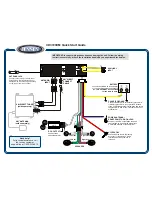
28
CLDC related content for JTWI
JTWI is designed to be implemented on top of CLDC 1.0 or CLDC 1.1. The configuration
provides the VM and the basic APIs of the application environment. If floating point
capabilities are exposed to Java Applications, CLDC 1.1 (not suported on V3x) will be
implemented.
The following CLDC requirements will be supported:
•
Minimum Application thread count will allow a MIDlet suite to create a minimum
of 10 simultaneous running threads
•
Minimum Clock Resolution – The method java.land.System.currentTimeMillis ()
will record the elapsed time in increments not to exceed 40 msec. At least 80%
of test attemps will meet the time elapsed requirement to achieve acceptable
conformance.
•
Names for Encodings will support at least the preferred MIME name as defined
by IANA (
http://www.iana.org/assignments/character-sets
) for the supported
character encodings. If not preferred name has been defined, the registered
name will be used (i.e UTF-16).
•
Character Properties will provide support for character properties and case
conversions for the characters in the Basic Latin and Latin-1 Supplement blocks
of Unicode 3.0. Other Unicode character blocks will be supported as necessary.
•
Unicode Version will support Unicode characters. Character information is based
on the Unicode Standard version 3.0. Since the full character tables required for
Unicode support can be excessively large for devices with tight memory budgets,
by default, the character property and case conversion facilities in CLDC assume
the presence of ISO Latin-1 range of characters only. Refer to JSR 185 for more
information.
•
Custom Time Zone Ids will permit use of custom time zones which adhere to the
following time xone format:
o
General Time Zone: For time zones representing a GMT offset value,
the following syntax is used:
Custom ID:
•
GMT Sign Hours: Minutes
•
GMT Sign Hours Minutes
•
GMT Sign Hours Hours
Sign: one of:
•
+ -
Hours:
•
Digit
•
Digit Digit
Minutes:
















































